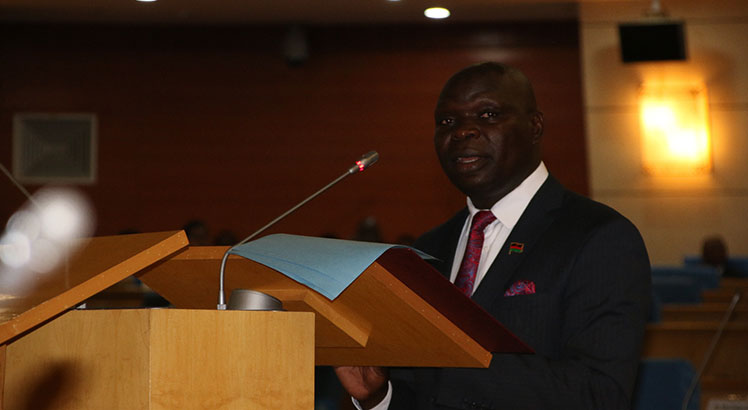K540BN added to budget
Minister of Finance and Economic Affairs Simplex Chithyola Banda yesterday presented his maiden financial plan, the 2023/24 Mid-Year Budget Review Statement that has adjusted expenditures by K540 billion to K4.33 trillion.
The 14.2 percent increase on the initial K3.79 trillion fiscal plan implemented from April 1 this year is largely meant to accommodate the social protection measures the Malawi Government seeks to implement to cushion vulnerable sections of the population from the impact of the 44 percent kwacha devaluation.
Delivering the financial plan in Parliament in Lilongwe yesterday, Chithyola Banda, who barely a month ago swapped portifolios with his predecessor Sosten Gwengwe now heading Ministry of Trade and Industry, cut an optimistic figure with all eyes on him to hear how he planned to salvage macroeconomic variables that have gone off-track and the spillover effects from the devaluation implemented on November 9.

Expenditures
In the Mid-Year Budget Statement, the government has re-introduced the price shock urban emergency cash transfer programme that will target 105 000 households in Mzuzu, Blantyre, Zomba and Lilongwe cities with a one-off cash transfer of K150 000 covering three months.
The Ministry of Finance and Economic Affairs also plans to increase the social cash transfer levels by 57 percent and has raised the social cash transfer coverage from 10 percent to 15 percent of the population.
Civil servants have on average been given a nine percent pay rise after the minister raised the wage bill from K900.44 billion to K980.49 billion, almost 25 percent of the total budget.
Revenues
To cover the shortfalls, Chithyola Banda announced an adjustment in revenue projections by K500 billion from K2.5 trillion to K3.05 trillion, a 20 percent increase.
Out of the projected K3.05 trillion revenue, K2.24 trillion will be raised from domestic taxes and K645.94 billion in grants, among other sources.
Chithyola Banda also announced that the government will receive $240 million (about K408.0 billion) between now and the end of the current fiscal year in March 2024.
Growth
But the minister will have more than the public’s apprehension to the economic reforms agreed with the International Monetary Fund (IMF) as the key economic variables that underpinned the 2023/24 fiscal plan have gone off the rails.
He projected that the local economy will grow by 1.5 percent, 44 percent lower than the projection made by his predecessor when he presented the budget in March this year.
Said Chithyola Banda: “The downward revision is attributed to several factors, including the macroeconomic imbalances due to the exchange rate misalignment and the resultant shortages of foreign exchange for importation of raw materials, Russian-Ukraine war and the tail-end impacts of Cyclone Freddy.”
Inflation
The ministry also expects the kwacha devaluation coupled with the potential rise in food prices to keep inflation elevated.
In this regard, the ministry assumes that inflation will rise to an average of 29 percent before declining and stabilising at around 27.1 percent in 2024.
The budget projected inflation to “slightly decrease” from an average of 20.9 percent last year to 18.2 percent this year on account of an expected increase in agricultural output and economic recovery from exogenous shocks such as the Russia-Ukraine war and the Covid-19 pandemic.
Reactions
Reacting to the developments, economic analyst Exley Silumbu said the revenue collections are attainable if the government can collect more from consumer taxes.
In a telephone interview last evening, he said revenue from consumer taxes such as value-added tax could rise because the prices of goods and services are climbing.
However, Silumbu, who has taught economics at the University of Malawi, expressed concern that the jump in revenue might not make much difference on government expenditures.
He said: “If the rise in revenue is lower than the inflation rate, then it will not have that much of an impact on how much the government can do [with the extra money]. The purchasing power has gone down so the government will get less for its money.”





